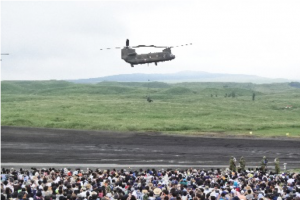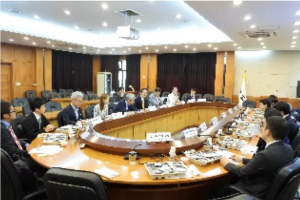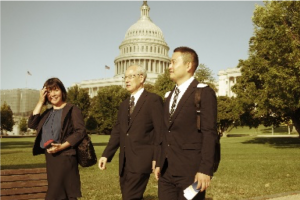International Security Studies Program
RIPS Security Studies Fellowship Program started in 1984 and produced 150 graduates by 2023. Many of them have pursued active careers, introducing security studies programs in their respective universities, assuming important positions in national academic associations such as the Japan Association of International Politics and the Association of International Security Studies. Many of them also actively participate in international seminars and conferences abroad.
Since 2006 the program is extended to government officials of the Ministries of Foreign Affairs and of Defense. The mixture of academics and government officials help intellectually stimulate each other and enrich their views.
The fellowship runs for two years. In addition to monthly seminars, the program takes the fellows to South Korea to visit places such as the DMZ area and to hold discussions with Korean counterparts. They also visit Washington to visit the State Department and the Pentagon and to exchange views with government officials and think tank scholars.
For the last two years the program has been directed by Professor Matake Kamiya of National Defense Academy, Professor Yuichi Hosoya of Keio University, and Professor Ayako Kusunoki of International Research Center for Japanese Studies.
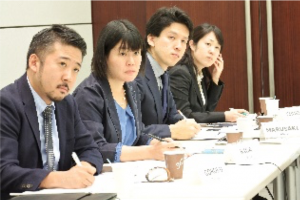
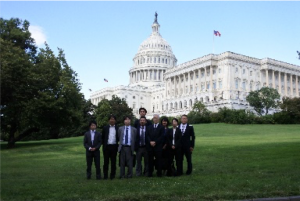
Program Directors
KAMIYA, Matake
Mr. Matake Kamiya is currently professor of international relations at the National Defense Academy of Japan. He was a graduate of the University of Tokyo, School of Liberal Arts, and Columbia University, Graduate School of Arts and Sciences (as a Fulbright grantee). He is also editor-in-chief of Discuss Japan - Japan Foreign Policy Forum, visiting superior research fellow at the Japan Forum on International Relations, and a member of the board of directors of the Japan Association for International Security. He has been a signatory to Global Zero since December 2009. His current research interests include Japanese foreign and security policies, Japanese-style realism (genjitsu-shugi), the U.S.-Japan security relations, the Asia-Pacific security, and nuclear issues including Japan’s (non-)nuclear policy. His recent publications include: Security Studies, 4th edition, (Tokyo:Aki-shobo, 2009), The US-Japan Alliance: Where from and Where to?," in Carl Baker, et al.eds., Doing More and Expecting Less: The Future of Alliances in the Asia Pacific (Honolulu, Pacific Forum CSIS, 2013).
HOSOYA, Yuichi
Dr. Yuichi Hosoya is professor of international politics at Keio University, Tokyo, and Director, Keio Center for Strategy. Professor Hosoya is also the Director of Research at the Asia-Pacific Initiative (API), Tokyo. Professor Hosoya was a member of Prime Minister’s Advisory Panel on Reconstruction of the Legal Basis for Security (2013-14), and Prime Minister’s Advisory Panel on National Security and Defense Capabilities (2013). Professor Hosoya studied international politics at Rikkyo (BA), Birmingham (MIS), and Keio (Ph.D.). He was a visiting professor and Japan Chair (2009–2010) at Sciences-Po in Paris (Institut d’Études Politiques), a visiting fellow (Fulbright Fellow, 2008–2009) at Princeton University and Visiting Fellow at Downing College, the University of Cambridge (2021-2022). His research interests include the postwar international history, British diplomatic history, Japanese foreign and security policy. His recent publications include Security Politics: Legislation for a New Security Environment (Tokyo: JPIC, 2019); History, Memory & Politics in Postwar Japan (Co-editor, Lynne Rienner: Boulder, 2020); Modern Japan’s Place in the World (Co-editor; Springer, 2023); and The Transformation of the Liberal International Order: Evolutions and Limitations (Co-editor; Springer, 2023). His comments often appeared at major international and Japanese media.
KUSUNOKI, Ayako
Dr. Ayako Kusunoki is Professor of International Research Center for Japanese Studies (Nichibunken), Kyoto, Japan. She received a doctoral degree in political science at the Graduate School of Law, Kobe University. She is the author of Gendai Nihon Seijishi dai 1 kan: Senryo kara Dokuritsu he (Contemporary Japanese Political History vol. 1: Occupation and the Peace Treaty of Japan), 2013 and Yoshida Shigeru to Anzen Hosho Seisaku no Keisei: Nichibei no Anzen Hosho Koso to sono Sogo Sayo, 1943-1952 (Yoshida Shigeru and the Making of Japan’s Postwar Security Policy: the Interaction of Ideas for Peace and Stability between the United States and Japan, 1943-1952), Minerva Shobo, 2009. One of her recent research interests has been the Peace Treaty with Japan, which produced “US Policy for the Occupation of Japan and Changes to It,” Yamauchi, Masayuki and Yuichi Hosoya eds. Modern Japan’s Place in World History. Springer (Open Access), March 24, 2023, and “Tasuu kowa to kandai na kowa: Nihon no koso to sentaku (Majority Peace and Benevolent Peace: Japan’s Ideas and Decisions),” Shin Kawashima and Yuichi Hosoya eds., San Francisco kowa to higashi Asia (San Francisco Peace Treaty and East Asia) (University of Tokyo Press, 2022).
Fellowship Program highlights
(1) Monthly lecture-discussion sessions
The Fellows meet at RIPS’ seminar room on a monthly basis for lecture-discussion sessions. Guest lecturers are invited to discuss up-to-date security issues. They are typically scholars and practitioners from universities, research institutes, and state authorities like the Ministry of Defense. After one-hour lecture, questions and discussions are open to the Fellows.
(2) Research paper review sessions and final paper presentation
The research paper review sessions are met four times during the two-year term. The Fellows are to present their research questions, structure, methodology, and contents. Instructions are provided by the Directors and comments are also shared by the Fellows during the subsequent discussion sessions. Their final papers will be presented in June 2018. For each presenter, an external discussant (former RIPS Fellow) is invited to make comments and evaluations on his/her paper.
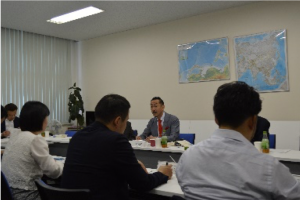
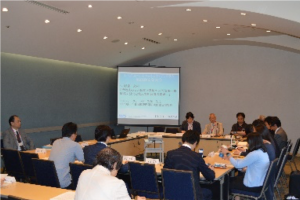
(3) Study visits
Three study visits are conducted during the two-year term. They are: a) Observation of the JSDF firepower exercise at Fuji (August 2016); b) Study visit to Seoul (September 2016); and, c) Study visit to Washington, D.C. (September 2017)
(4) Seminars
The Fellowship program also organizes a public seminar in Osaka every year. In this occasion, several leading scholars and practitioners are invited to speak on current security issues. The seminars are open to general public and questions and discussions are accepted.
